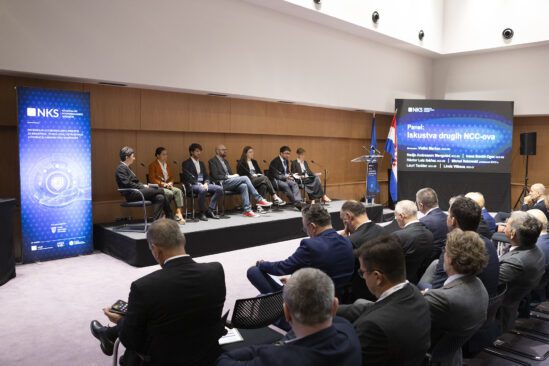The First National Cybersecurity Conference, organized by the National Coordination Center for Industry, Technology, and Research in Cybersecurity (NCSC), opened today in Zagreb. The event is being held at the National and University Library and has gathered experts from Croatia and Europe to exchange ideas and knowledge in order to jointly address current and future challenges in strengthening cybersecurity. The conclusion from the first day of the conference is that only through joint action of national coordination centres, in collaboration with the central European centre, can we respond to the cybersecurity challenges that will face all stakeholders of the global network in the future.
“National coordination centres in European countries act as national-level contact points, providing expertise and actively contributing to strategic tasks outlined in the Regulation, while promoting the relevant outcomes of the Network, the Community, and the ECCC, which is also the primary mission of Croatia’s NCC. All national coordination centres collaborate with national bodies and contribute to promoting and expanding educational programmes, encouraging and facilitating the participation of all stakeholders in cross-border and EU-funded projects, and implementing financial support activities for third parties. The NCC is already working with a wide range of stakeholders, including industry representatives, entrepreneurs, and startups, and we will continue to do so in the future. Maintaining relationships with the academic and research community is critical as they are the drivers of innovation, and the public sector is also important given its specific needs in the field of cybersecurity, as well as the general public – households in particular”, emphasized Vlatka Marčan, Deputy CEO of CARNET and Head of the NCC-HR.
The first day of this international conference organized by the NCC-HR focused on regulatory frameworks and strategies aimed at strengthening cybersecurity, with leading experts from various sectors sharing their insights. Special attention was drawn to a presentation by Luca Tagliaretti, Executive Director of the European Cybersecurity Competence Centre (ECCC), who discussed European trends and strategies, highlighting the importance of collaboration between national centres and the European one.
“I firmly believe in the importance of National Coordination Centres (NCCs) and the implementation of their activities. No country or European institution can tackle the challenges ahead on its own, so it is crucial that we work together and collectively overcome all possible threats. This conference is not just a formal meeting, but an opportunity for us to come together in the process of strengthening cybersecurity. I would compare National Coordination Centres to players that form a sports team. That team, through joint efforts, contributes to the improvement of the entire community and towards a better and safer digital future. We face many challenges, so it’s important to plan our common future and find new solutions,” said Luca Tagliaretti, Executive Director of the ECCC.
As the representative of the Prime Minister of the Republic of Croatia, Bernard Gršić, State Secretary in the Ministry of Justice, Public Administration and Digital Transformation, participated in the conference’s opening. In his address, he emphasized the ultimate goal of the efforts of all involved in cybersecurity – creating an organized, accessible, open, and secure Croatian cyberspace.
“Alongside all the activities being carried out in the process of digital transformation in Croatia, cooperation between EU countries is crucial to ensure accessible, open, and secure cyberspace for Croatian citizens. Security is one of the fundamental concerns for any country, and cybersecurity is increasingly important as we are more and more integrated into cyberspace – a space where various incidents undermine our safety and peace in the digital world. New technologies are no longer a privilege for a select few, but are accessible to a wide range of users. Different types of cyberattacks are becoming more sophisticated and complex, affecting our everyday lives and businesses, so it’s essential to raise awareness of potential cyber threats and how to protect against them,” emphasized Bernard Gršić, representative of the Prime Minister of the Republic of Croatia and State Secretary in the Ministry of Justice, Public Administration, and Digital Transformation.
The first conference panels paid special attention to the topic of future challenges in the field of cybersecurity. Nataša Glavor, Deputy CEO for the National CERT, provided participants with a detailed overview of European trends and various strategies in cybersecurity. The conference has proven to be an excellent platform for networking and sharing best practices with European experts. Experts from European Cybersecurity Competence Centres in Denmark, Germany, Spain, Estonia, and Latvia shared successful case studies and innovative approaches they are implementing in the field of cybersecurity at both national and global levels.
In addition to inspiring discussions and presentations, this conference offers an ideal opportunity for networking and gaining new skills, which is crucial for the further development and improvement of cybersecurity in Croatia. Over two days, the conference will gather around 300 experts from Croatia and abroad, with the number expected to grow even more due to live streaming.
The second day of the conference will focus on small and medium-sized enterprises and startups, with an emphasis on funding opportunities through EU programmes and practical workshops for project applications. A workshop will also be held where participants will go through the entire project proposal application process, rounding off a rich program aimed at building a safer digital future.
About NCC:
The National Coordination Center for Industry, Technology, and Research in Cybersecurity (NCC-HR) was established in accordance with the Regulation of the European Parliament and the Council, and is managed by CARNET. The NCC-HR plays a key role in strengthening Croatia’s ability to defend against cyberattacks, promoting participation in EU projects, providing technical support, and offering financial assistance to various stakeholders.
With the establishment of the NCC-HR, Croatia has become an active participant in the European initiative to strengthen cybersecurity. The Croatian NCC is part of a network of European NCCs, ensuring that our country is an integral part of the European cybersecurity system, with the goal of protecting digital infrastructure and increasing global competitiveness.



